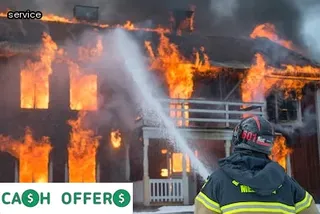When selling a home in Vermont, it is important to understand the regulations surrounding lead paint disclosure. Sellers are required to disclose all information they have regarding the presence of lead-based paint or other hazards in any house built before 1978.
Additionally, they must provide buyers with an Environmental Protection Agency (EPA) pamphlet on identifying and controlling lead-based paint hazards. Homeowners should also keep detailed records of any renovations that could have disturbed lead-based paint and must present these records if requested by potential buyers during the home inspection process.
Furthermore, sellers are required to provide a ten-day window for prospective buyers to complete a risk assessment or inspection for lead based paint hazards before closing the sale. It is important to note that failure to comply with Vermont's lead paint regulations can result in civil penalties so sellers should be sure they understand their obligations when it comes to disclosing this information.

Real estate agents have an obligation to disclose certain information when selling a home in Vermont. For starters, they must provide the buyer with copies of all relevant contracts, including the purchase and sale agreement, mortgage documents, and lease agreements.
They also need to disclose any known defects or material facts regarding the property that could affect the buyer's decision. This includes any environmental hazards, such as asbestos or lead paint, as well as any conditions of the title that may limit use of the property.
Additionally, agents must inform buyers about zoning ordinances or covenants that could impact their use of the property, such as restrictions on construction projects or limits on occupancy. Finally, it is important for agents to inform buyers about any liens against the property and whether there are any pending lawsuits related to it.
Agents should be familiar with these disclosure requirements in order to protect their clients’ interests and ensure a smooth real estate transaction.
When selling a home in Vermont, it is important to understand the value of making disclosures to potential buyers. Disclosures provide buyers with valuable information about a property that may not be obvious to them when viewing the home and can help them make an informed decision regarding their purchase.
Knowing the complete guide to home disclosure requirements when selling in Vermont can help sellers avoid any potential legal issues that could arise from failing to provide required information about a property. It is also important for sellers to remember that making accurate and timely disclosures can add value to their home by providing buyers with the assurance that all of the necessary details have been revealed up front.
Making sure one follows the disclosure requirements in Vermont is key for both buyers and sellers alike as it helps protect against any unforeseen costs or liabilities down the road.

When it comes to selling a property in Vermont, there are many legal disclosure requirements that must be met. It is important to understand the complexities of these regulations and when and how to seek legal advice concerning property transactions in Vermont.
Seeking counsel from a real estate attorney can help ensure that all state laws have been properly followed and all paperwork is correctly filed. A seasoned attorney can also provide guidance on issues such as title searches, transfer taxes, zoning restrictions, deed transfers, and more.
Homeowners should consider seeking legal advice before signing any documents related to selling their property or entering into an agreement with a buyer or seller. Receiving expert advice will not only help protect homeowners from potential liabilities but also give them peace of mind that they are in compliance with all applicable laws.
When selling a home in Vermont, it is important to understand the disclosure requirements that are necessary. Property sellers in the state must provide buyers with a Seller's Property Disclosure Statement, which outlines any known defects or issues with the property.
It is also important to be aware of any environmental hazards, including lead paint and radon gas, which must be identified during the sale. Additionally, septic systems must meet certain standards and any violations must be addressed before closing.
Understanding these regulations can help simplify the process of selling a home in Vermont and ensure that both buyer and seller are protected throughout the transaction.

When selling a home in Vermont, finding the right real estate agent can be a daunting task. It is important to take the time to research and compare different agents in order to find one who will best meet your needs.
You should also compare rates between agents and ask about any additional fees or services offered that may be beneficial for you. Additionally, check out online reviews or ask friends and family for referrals of reliable agents they have worked with in the past.
Most importantly, make sure the agent is well-versed in local disclosure requirements for selling a home in Vermont, as these are legally required documents that must be disclosed before closing on the sale. Finding an experienced real estate agent at a reasonable rate can help ensure that all disclosure requirements are met and the sale of your home goes smoothly.
When selling a home in Vermont, there are certain disclosure forms that are legally required by the state. These forms include a Property Condition Disclosure Statement, Lead Paint Disclosure Form, Septic System Disclosure Form and Radon Gas Disclosure Form.
The Property Condition Disclosure Statement outlines any known issues with the property and is used to inform buyers of what they can expect when purchasing the home. The Lead Paint Disclosure Form is legally required for homes built before 1978, and it informs buyers of any lead-based paint present in the home.
The Septic System Disclosure Form disclses information about the septic system and its components, such as age and capacity. Finally, the Radon Gas Disclosure Form notifies buyers of any potential radon gas presence on the property and advises them to test for it prior to closing on the sale.
Together, these four disclosure forms provide important information to potential buyers so they can make informed decisions when purchasing a home in Vermont.

In today's digital world, the home buying and selling process can be greatly simplified by utilizing technology. From virtual tours to online contracts, the use of technology can help streamline the process from start to finish.
When it comes to selling a home in Vermont, understanding the disclosure requirements is essential for a successful sale. Fortunately, there are several resources available that can explain these requirements in detail and provide guidance on what needs to be disclosed during a sale.
A complete guide for home disclosure requirements when selling in Vermont can provide detailed information about what needs to be revealed and how best to utilize technology for a smooth transaction. By utilizing tools such as electronic signatures and video conferencing, sellers can simplify the process while still meeting all of their obligations under Vermont law.
Additionally, with automated document management systems, buyers and sellers alike have access to documents quickly and securely. The combination of these technologies can make the entire buying/selling process easier for everyone involved.
When selling a home in Vermont, understanding the disclosure requirements is vital for a successful transaction. The seller must provide the buyer with full disclosure of any known defects in the property.
One way to ensure all relevant information is included is to use one of the free forms available online. These comprehensive forms cover everything from water and septic systems to hazardous materials and energy conservation.
They also contain questions about pest control, building permits, prior legislation and more. Knowing what you are legally responsible for disclosing can help avoid potential issues down the road and ensure that both parties are fully informed.
It’s important to note that these free forms should not be used as a substitute for professional advice when completing a sale/purchase transaction, but they can be used as an effective resource when assessing disclosure requirements and providing necessary information to buyers.

When it comes to selling a home in Vermont, timing is everything. In this state, sellers must be aware of the extensive disclosure requirements before putting their homes on the market.
To ensure a successful sale, it is important to consider the best time of year to put a home up for sale. Generally speaking, spring and summer tend to be the most popular times for real estate markets in Vermont due to the influx of buyers wanting to move before school starts back up.
However, those looking to get ahead of the competition might find more success by listing earlier in the year when there are fewer listings available and demand isn’t as high. Additionally, keeping an eye on market trends can help sellers determine when home prices are at their peak in their area and which months will yield maximum profit.
Although other factors such as location and condition will always play a role in pricing and sales, understanding how seasonal fluctuations affect the market can be one of the most valuable tools at a seller’s disposal.
When selling a home in Vermont, it is important to understand the potential costs associated with the process. These costs can include state and local taxes, fees for title searches, appraisal costs, and closing costs such as attorney’s fees and escrow deposits.
It is also important to factor in the cost of repairs that must be made before listing a home, as well as commission fees paid to real estate agents. In addition, there are other expenses that could arise that could result in additional costs such as prorated utility bills or taxes.
Understanding all of these expenses prior to listing a home will help sellers calculate the true cost of selling their home in Vermont.

When selling property in Vermont, it is important to understand the legal requirements and considerations associated with home disclosure. Home sellers must be aware of their obligations when it comes to disclosing any material defects or liabilities that may affect the value of their property.
Additionally, there are other factors to consider such as zoning restrictions, existing liens, and potential environmental concerns that can affect the sale. It is essential for sellers to thoroughly review all relevant laws before they list their property in order to ensure they are meeting all applicable state regulations.
Furthermore, sellers should familiarize themselves with the home disclosure process and what information must be disclosed in accordance with Vermont law. By understanding all legal requirements and considerations related to selling a home in Vermont, sellers can be confident that they are taking the necessary steps to protect their interests throughout the sales process.
When considering the sale of a home in Vermont, there are multiple options available to sellers. These include traditional real estate agents, flat-fee listing services, and FSBO (For Sale By Owner).
Each option has its own set of advantages and disadvantages that should be taken into account when deciding which one to choose. A traditional real estate agent will typically take a commission on the house's final sale price but can provide a wide range of services, including advertising, negotiations with buyers, and help with home disclosure requirements.
Flat-fee listing services charge a one-time fee and allow the seller to maintain some control over the process while also providing access to MLS (Multiple Listing Service) listings. Finally, FSBO allows owners to list their homes without any other assistance or fees but requires sellers to manage all aspects of the sales transaction themselves, including compliance with home disclosure regulations.
All three options have varying levels of complexity and it’s important for sellers in Vermont to understand each before making the decision about which is best for them.

The negotiation process of selling a home in Vermont can be complex, but the right preparation and understanding of the requirements can make it easier. The first step is to understand how offers work, including the types of offers that may be presented during negotiations.
A buyer’s offer should include an appraisal and inspection report as well as an earnest money deposit. A seller may then present a counteroffer that includes specific terms of the sale which both parties must agree upon before anything else is finalized.
Once both parties have agreed on the terms of sale, they will sign the contract which will then become legally binding. It’s important to note that if either party does not adhere to their commitments outlined in the agreement, there could be serious legal consequences.
Knowing all your rights and responsibilities ahead of time will help ensure a smooth transaction for everyone involved.
When selling a home in Vermont, it is important to understand the disclosure requirements and escrow processes that must be followed. An escrow process is when the buyer and seller deposit money with a third party to manage or facilitate the transaction.
In Vermont, this money is generally placed into an escrow account by the title company or real estate broker and is held until all conditions of the sale have been met. The funds are managed and dispersed according to state laws that require certain documents be signed before any money can change hands.
For instance, sellers must provide a copy of their deed before any funds can be released from the escrow account back to them. Additionally, buyers must also sign off on their loan documents prior to closing on the house sale.
It is important for both parties to understand these regulations so they can properly prepare for their home sale in Vermont and ensure that all legal requirements and escrow processes are followed correctly.

Selling a house in Vermont can be a complicated process, especially when it comes to disclosure requirements. Before listing your property for sale, it is important to understand which disclosures must be made and what information is necessary to provide potential buyers.
The primary disclosure requirement when selling a home in Vermont is the Transfer Disclosure Statement (TDS), which alerts buyers of any known defects or issues that could affect the value of the property. Additionally, buyers should also receive a copy of an Inspection Report disclosing any known material defects such as roof repairs, plumbing problems, or electrical issues.
Other relevant details that should be disclosed include lead paint hazards (if applicable) and whether or not the property is located in a flood zone. It's also important for sellers to inform potential buyers of any expired permits or violations related to their property, as well as any agreements with local homeowners' associations that will remain in effect after closing.
Being aware of all these disclosure requirements can help ensure that both parties are informed and protected during the home buying process in Vermont.
When selling a home in Vermont, it's important to understand the local disclosure requirements. This can be especially true when it comes to mortgage refinancing or other financing solutions.
Homeowners should familiarize themselves with the type of mortgage or loan they are applying for, as well as the terms and conditions associated with that type of loan. It is also essential to consider the current market trends and how they might affect your particular situation.
Additionally, it is important to understand the potential risks associated with refinancing and other financing solutions. Consulting with a financial professional can help provide clarity on these issues and can assist in ensuring that you make an informed decision when it comes to purchasing or refinancing a home.

When selling residential property in Vermont, it is important to be aware of the tax implications that may arise. Depending on the situation, there are numerous taxation regulations that sellers must comply with.
For instance, if a seller lives outside of Vermont but owns a home within the state, they may be liable for income taxes on any capital gains from the sale. Additionally, if the home has been used as a rental property for more than two years prior to sale, the seller will need to pay capital gains tax on the net rental income from those two years.
Furthermore, if a seller has owned their home for less than one year before selling it, they may be required to pay a withholding tax at closing. Lastly, all sellers are obligated to disclose any known defects or problems with the home to potential buyers and must include this information in their real estate contracts.
Understanding these various tax implications can help ensure that all parties involved in a residential property transaction have an accurate understanding of any applicable taxes or fees associated with the sale.
When selling a home in the state of Vermont, it is important to understand the disclosure requirements that must be met in order to complete a successful real estate transaction. The key documents required for completing real estate transactions in VT include disclosure forms, lead-based paint disclosures, termite inspection reports, and other related paperwork.
Disclosure forms are necessary for providing buyers with information about any known issues with the property such as water damage or mold. Lead-based paint disclosures are required when selling homes built before 1978 and must include an inspection report from a licensed professional.
Termite inspection reports are also necessary for determining if there is evidence of termite activity on the property. It is essential for sellers to provide these documents to buyers in order to ensure that all parties involved have sufficient knowledge about the condition of the property prior to closing.
Additionally, all parties must sign off on each document before finalizing a sale. By understanding and fulfilling home disclosure requirements when selling in VT, homeowners can ensure that their real estate transactions go smoothly and without complications.
Vermont is a full disclosure state when it comes to selling a home. As a seller, you must disclose all known material defects or risks related to the property, including environmental hazards and neighborhood crime rates.
Vermont law also requires that you provide potential buyers with an accurate and complete list of repairs or renovations made within the last five years. This information needs to be included in your real estate listing or contract.
With detailed knowledge of Vermont's full disclosure requirements, sellers can ensure that their transactions are compliant with state regulations and protect themselves from any potential legal issues. The Complete Guide To Home Disclosure Requirements When Selling In Vermont can help sellers understand the ins and outs of this important process so they can make informed decisions before they enter into an agreement.

When selling a house in Vermont, it's important to understand the state's home disclosure requirements. The process of selling a home can be complex and stressful, and hiring a lawyer to help you navigate the process is highly recommended.
A lawyer can provide valuable guidance on the disclosure documents that must be completed before listing your property for sale, as well as assist with any potential legal issues that may arise. With their help, you can ensure you meet all of Vermont’s home disclosure laws and regulations when selling your house.
In addition to helping you comply with the state's disclosure requirements, lawyers are also knowledgeable about other aspects of the real estate transaction such as title searches and mortgage financing options.
Selling your house in Vermont without a realtor can be intimidating, but if done correctly, it can save you time and money. The Complete Guide to Home Disclosure Requirements When Selling in Vermont provides an easy-to-follow roadmap for navigating the process.
This guide outlines the disclosure requirements and other important steps needed to sell your home without professional help. It includes details on how to research local market conditions, prepare your home for sale, and create marketing materials that are legally compliant with Vermont’s laws.
Additionally, this guide covers the paperwork required when transferring ownership of your house, as well as tips on negotiating with buyers and avoiding potential pitfalls. By following the steps outlined in this comprehensive guide, you can confidently sell your home without a realtor in Vermont.
Yes, you can sell a house as is in Vermont, but there are certain disclosure requirements that must be met. It's important to understand the home disclosure requirements when selling in Vermont so that you can ensure that you are adhering to all applicable laws.
The Complete Guide To Home Disclosure Requirements When Selling In Vermont provides a comprehensive overview of the things you need to consider when putting your home on the market. This guide explains what items must be disclosed and how to disclose them properly.
Additionally, it outlines any other relevant information related to home sales in Vermont such as zoning regulations and transfer taxes. By taking the time to thoroughly read through this guide, sellers can rest assured knowing all disclosure requirements have been met and they are conducting a legal sale of their property.
A: When selling a house in Vermont, it is important to provide the necessary disclosures to potential buyers, such as any known material defects regarding the property. Additionally, it is recommended to provide a Comparative Market Analysis (CMA) prepared by the Realtor or Broker that compares your property to similar properties in terms of size, condition and location.
A: When selling a house in Vermont, you must provide the buyer with a title insurance policy issued by a licensed title company. Additionally, you may be required to provide the buyer with a warranty deed or other applicable documents related to specific property conditions.
A: When selling a house in Vermont, the seller must provide the buyer with a disclosure statement that includes the property’s physical address and zip code, any fire prevention devices such as smoke detectors, and a copy of any trust documents related to the sale.
A: As a seller of a residential property in Vermont, you are required to disclose all material facts that could affect the value of the property. This includes any information about housing prices, inspector reports, and homeowners insurance. It is important to consult with a real estate attorney to ensure that all legal requirements are met.
A: In Vermont, real estate sellers are subject to the legal principle of caveat emptor (“let the buyer beware”). As such, it is the seller’s responsibility to disclose any material facts that may affect the value or desirability of the property, including any damages. This requirement extends to all sales conducted through a Realtor or Broker as well.